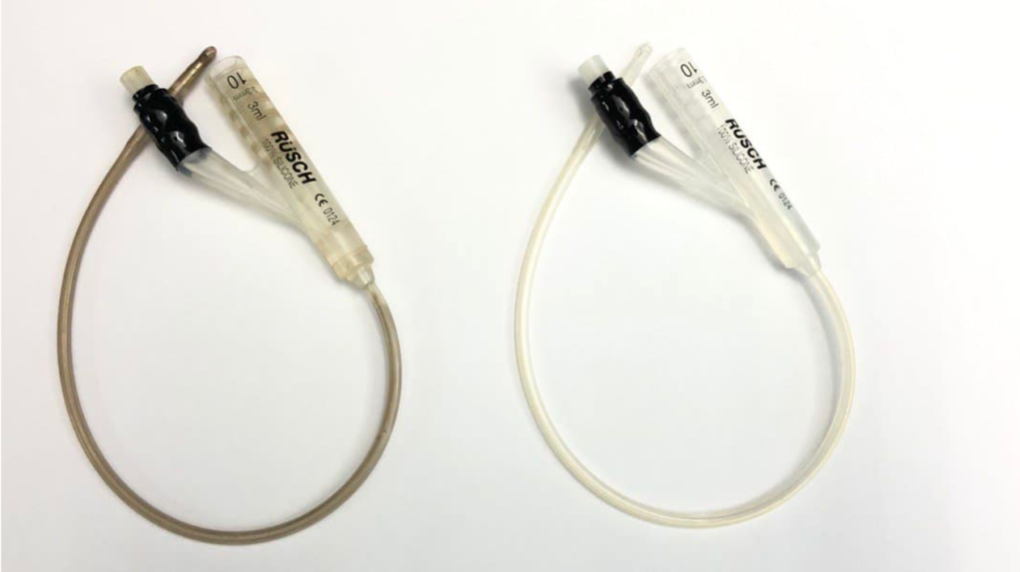UBC researchers discover 'silver bullet' for protecting medical devices from infection
 Two catheters, one with a silver coating designed to kill bacteria, are seen in an image provided by the University of British Columbia. (Credit: Kizhakkedathu Lab)
Two catheters, one with a silver coating designed to kill bacteria, are seen in an image provided by the University of British Columbia. (Credit: Kizhakkedathu Lab)
A team of researchers from the University of British Columbia and Vancouver Coastal Health has discovered a “silver bullet” that kills bacteria and prevents them from infecting patients with implanted medical devices.
While devices such as stents and feeding tubes can save lives, the researchers noted they can also pose a significant risk of infection, particularly if there’s any contamination during the implant procedure.
The team’s solution is a silver-based coating that can be applied to a variety of medical devices, including catheters – which are associated with 95 per cent of urinary tract infections, according to a study from the Infectious Diseases Society of America.
“This is a highly effective coating that won’t harm human tissues and could potentially eliminate implant-associated infections. It could be very cost-effective and could also be applicable to many different products,” said Dr. Jayachandran Kishakkedathu, a professor in UBC’s pathology department, in a news release.
Although silver is an effective antimicrobial, it has a toxic effect when used in implants and medical devices. The new coating technology has solved that issue and led to a new method of preventing bacteria from adhering to the devices, researchers explained to CTV News.
The coating was tested for one month in an environment with a high concentration of various bacteria known to cause infection. The device came away with “no bacteria attached,” according to UBC. A seven-day test with live rats showed the same results and no damage to the rats’ tissues.
“We’re preventing that by keeping bacteria off the surface in the first place and then killing them with the release of silver. Since we prevent attachment of both live and dead bacteria, this coating has significant potential to maintain a clean surface for any device or material for an extended period of time, which is something we haven’t seen so far,” said Dr. Dirk Lange, the associate professor in UBC’s department of Urologic Sciences, in the release.
Researchers suggest the “silver bullet” would add about 50 cents to the cost of a catheter, and it works on different materials.
According to the team, the silver-based coating can be applied to:
- central venous catheters
- urethral catheters
- peritoneal catheters
- feeding tubes
- vascular grafts
- ureteral stents or orthopaedic implants.
The study is currently in the proof-of-concept phase, and it might take five to 10 years to complete the clinical evaluation.
CTVNews.ca Top Stories

Trudeau's 2024: Did the PM become less popular this year?
Justin Trudeau’s numbers have been relatively steady this calendar year, but they've also been at their worst, according to tracking data from CTV News pollster Nik Nanos.
Back on air: John Vennavally-Rao on reclaiming his career while living with cancer
'In February, there was a time when I thought my career as a TV reporter was over,' CTV News reporter and anchor John Vennavally-Rao writes.
The winter solstice is here, the Northern Hemisphere's darkest day
The winter solstice is Saturday, bringing the shortest day and longest night of the year to the Northern Hemisphere — ideal conditions for holiday lights and warm blankets.
What we know about the suspect behind the German Christmas market attack
Germany on Saturday was still in shock and struggling to understand the suspect behind the attack in the city of Magdeburg.
Poilievre writes to GG calling for House recall, confidence vote after Singh declares he's ready to bring Liberals down
Conservative Leader Pierre Poilievre has written to Gov. Gen. Mary Simon, imploring her to 'use your authority to inform the prime minister that he must' recall the House of Commons so a non-confidence vote can be held. This move comes in light of NDP Leader Jagmeet Singh publishing a letter stating his caucus 'will vote to bring this government down' sometime in 2025.
Overheated immigration system needed 'discipline' infusion: minister
An 'overheated' immigration system that admitted record numbers of newcomers to the country has harmed Canada's decades-old consensus on the benefits of immigration, Immigration Minister Marc Miller said, as he reflected on the changes in his department in a year-end interview.
School custodian stages surprise for Kitchener, Ont. students ahead of holiday break
He’s no Elf on the Shelf, but maybe closer to Ward of the Board.
Kelly Clarkson's subtle yet satisfying message to anyone single this Christmas
The singer and daytime-talk show host released a fireside video to accompany her 2021 holiday album, “When Christmas Comes Around” that she dubbed, “When Christmas Comes Around…Again.
Pope Francis reprimands Vatican staff for gossiping in annual Christmas message
Pope Francis told Vatican bureaucrats on Saturday to stop speaking ill of one another, as he once again used his annual Christmas greetings to admonish the backstabbing and gossiping among his closest collaborators.

































